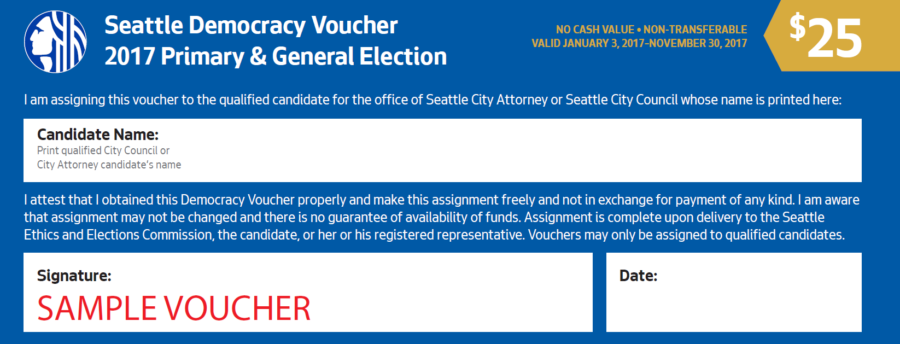Seattleites are flooding a small office in the Seattle Municipal Tower with stacks of mail. In the last eight weeks, city residents have sent more than 43,000 democracy vouchers to the city, each a small publicly funded donation to candidates running for city office. Though several public financing programs exist across the United States, Seattle’s voucher model is the first of its kind. This year marks only the second time the city is using the program, but already it’s demonstrating that vouchers are a game changer for public elections.
Barely two months since the city dropped the vouchers in the mail, more than 11,000 Seattleites have returned theirs. That’s already more individual donors than the city saw in all of 2015.

Thanks to the program, which was first used in 2017, nearly every Seattle resident age 18 years and older got four $25 democracy vouchers by mail in February. They now have the chance to give these vouchers to candidates for city office who pledge to rely on small-dollar donations and limit campaign spending.
The goal of the voucher program is to get candidates in touch with diverse Seattleites. By making nearly every city resident a potential donor, the program encourages competitive campaigns fueled by a broad base of donors. That’s a big change from business as usual, when the most successful candidates are often those with direct lines to the city’s one percenters—those with wallets fat enough to write big checks.
With all seven district city council seats up for election this cycle, stakes are high and the vouchers could have a lot of influence on election outcomes. Already, the number of campaign donors is soaring compared with the previous cycle, and many of the diverse candidates running are eagerly pledging to limit their spending in order to take part in the program.
Seattle is already seeing record donor numbers
Barely two months since the city dropped the vouchers in the mail, more than 11,000 Seattleites have returned theirs. That’s already more individual donors than the city saw in all of 2015, when nine city council seats were up for election and vouchers were not yet available.
Together, these early donors have returned half as many vouchers as Seattleites did in the entire inaugural 2017 election cycle. By comparison, at this same time in the 2017 cycle, the city had received just shy of 14,000 vouchers.
The city saw greater age, gender, and geographic diversity among voucher donors compared with cash donors in 2017. Voucher donors were also more likely than cash donors to live in lower-income neighborhoods and areas where people of color are the majority. It remains to be seen whether the city’s surging donor numbers are accompanied by a continued increase in donor diversity.
Candidate participation is soaring
Of the 57 candidates who have announced campaigns so far this year, 44 have pledged to be part of the voucher program. These candidates have agreed to limit their total campaign spending and cap the size of individual contributions in exchange for the chance to receive voucher contributions. Though most have yet to complete the qualifying process, including gathering 150 small contributions from city residents, the program has already dispensed nearly $300,000 to 11 candidates. Candidates can complete the qualification process at any time this cycle.
Vouchers are attracting diverse candidates
The voucher candidate pool is diverse. For most this is their first bid at public office. Of the 11 candidates who have received voucher donations to date, only one is an incumbent. The others include a physician working at a community health care center, a pharmacology Ph.D. student, a business owner operating several cannabis retail stores across the city, and a filmmaker. Several candidates also identify as people of color.
[content_box color=”green” type=”border”]
More Information
Are you a Seattle resident? Check out the city’s FAQ page to learn more about vouchers.
Are you a candidate (or want to be)? Check out the city’s resource page.
All district city council seats are up for election this year (find your district here). The primary is Aug. 9 and the general election is Nov. 5.
[/content_box]
With four open seats this year, it’s likely the city would have seen a slate of diverse new candidates regardless of the voucher program. The difference is that the vouchers are making it possible for these fresh faces to run competitive, well-funded campaigns even without a well-established network with the city’s typical donors.
Online donations are on the rise
This is the first year Seattleites can skip the paper and assign their vouchers to candidates using the city’s new online portal. Though only about 10 percent of voucher donations have been made via the portal so far, SEEC staff say use is on the rise. This online system could streamline the donation process, making it even easier for residents to participate, but they’ll have to get used to it first.
The spark for a lively election season
This year will provide more information about how the innovative voucher model for public funding impacts elections. We’ll be watching how donor and candidate diversity stacks up compared with pre-voucher elections, and whether the city sees any changes in voter turnout.
As we wait to learn more, it’s already clear the voucher program has helped get this year’s races off to a great start. With the number of contributors soaring, along with a diverse and activated candidate pool, Seattle can look forward to a lively and engaged election season.


Comments are closed.